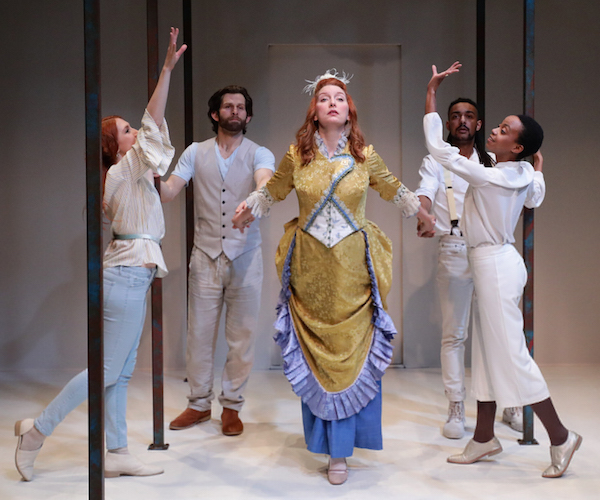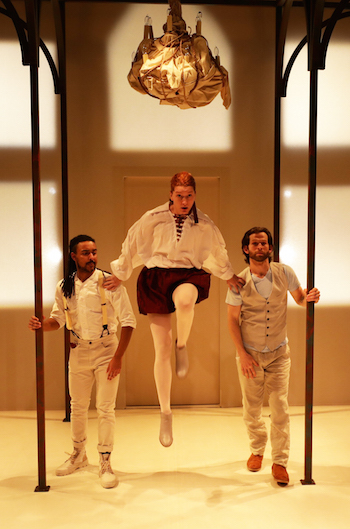Theater Review: “Orlando” — Asking What Gender Really Means
There is much to love in this Lyric Stage Company production and I recommend it highly.
Virginia Woolf’s Orlando, adapted by Sarah Ruhl. Directed by A. Nora Long. Staged by the Lyric Stage Company of Boston at 140 Clarendon Street, Boston, MA, through March 25.

Elise Arsenault, Jeff Marcus, Caroline Lawton, Rory Lambert-Wright, and Hayley Spivey in the Lyric Stage Company production of “Orlando.” Photo by Mark S. Howard
By Roberta Silman
In 1928, after writing her three masterpieces, Jacob’s Room (1922), Mrs. Dalloway (1925), and To The Lighthouse (1927), Virginia Woolf let herself go and wrote something entirely different: a zinging, exuberant romp called Orlando, A Biography which was published in 1928. This was after she had fallen in love with another English writer who, at the time, was a lot better known and more widely sold than Virginia: Vita Sackville West. Although Vita was in an open marriage with Harold Nicolson, a marriage filled with devotion and good companionship and which lasted until Vita’s death in 1962, she, and Harold, too, were bisexual, and Vita made no bones about her lesbian love affairs, the longest of which was with Violet Trefusis, nee Keppel. However, the most passionate may have been with Virginia.
When Virginia used Vita’s life and sexual proclivities to write the imaginative and now very relevant Orlando, Vita wasn’t entirely pleased. I think she felt used, and I can certainly understand why. Details of Vita’s life and ancestral history abound in this adventure story that spans centuries, and there are photos of Vita in my paperback edition of Orlando. Although Nigel Nicholson, Vita’s younger son, has called the book “a love letter to his mother,” and although it is dedicated to Vita and Virginia may indeed have intended it as exactly that, the story, over time, has become more universal and attained wider resonance. This was clear from the movie, Orlando, which came out in 1992 starring Tilda Swinton. It is also true of Sarah Ruhl’s 2010 stage adaptation, directed with great skill by A. Nora Long and beautifully acted by Caroline Lawton as Orlando along with a terrific supporting cast: Elise Arsenault, Michael Hisamoto, Rory Lambert-Wright, Jeff Marcus, and Hayley Spivey.
In this rollicking production Vita is not even mentioned. In a very spare but absolutely wonderful set designed by Richard Wadsworth Chambers, Orlando has become his/her own creation, born a boy in Elizabethan times who wakes up as a woman centuries later. And somehow it all makes sense in Ruhl’s play, which explores the enormous advantages of being a man: the wonderful skating on the frozen River Thames with the Russian Princess, the confusing crush on the Archduke/Archduchess, the ability to do what one wants and when, the freedom to choose whether to work on his poem, or to go shooting or even stabbing someone near. Ruhl sticks close to Woolf’s dialogue which is often hilarious, and everything about Orlando as a man is totally believable.

Rory Lambert-Wright, Caroline Lawton, Jeff Marcus in the Lyric Stage Company production of “Orlando.” Photo: Mark S. Howard
More suspension of disbelief is required — as somehow it is not in the book — when Orlando changes into a woman at the beginning of the 17th century in Constantinople, where he was sent as ambassador. Although the costumes are convincing and the situations make sense, you can feel Orlando’s unhappiness as she realizes how constricted women are, how people are always hovering over a woman, even how most women wear wedding rings and hide all sorts of things under their outrageous and annoying clothes. Lawton conveys this very convincingly and finally seems to soar again (as she has in the first act as a boy) in the final scene when she takes off to go shopping in her motor car in 1928 when modern life has begun. And the play is over.
There is much to love in this production and I recommend it highly. It will lift your spirits, make you think about what gender really means, what stereotypes we assign to the different genders, and how, almost a hundred years ago, it was as puzzling as some may find it now. Then the book was thought of as “a literary frivolity,” a fantasy, according to the afterword by Elizabeth Bowen in my edition. Now all the questions Orlando explores are less fantastical and have more to do with the new reality.
In the end, though, this amazing fiction that carries the day. By all means, see the play, but then buy a copy of Woolf’s Orlando and marvel at the breadth of Woolf’s imagination, the exhilarating prose, and let yourself join in the fun. As the program tells us, Virginia wrote in her diary after her devoted husband Leonard Woolf told her he admired it, “Leonard takes Orlando more seriously than I had expected. The truth is I expect I began it as a joke.”
Real genius is often way ahead of its time. This may be the case with Orlando and with each new adaptation, each new pair of eyes looking at the original and molding it to its own times. One can only wonder what audiences fifty years from now may make of this wonderful evening in the theater.
Roberta Silman is the author of three novels, a short story collection and two children’s books. Her new novel, Secrets and Shadows, will be available on March 5th. A recipient of Fellowships from the Guggenheim Foundation and the National Endowment for the Arts, she has reviewed for The New York Times and The Boston Globe, and writes regularly for The Arts Fuse. More about her can be found at robertasilman.com and she can also be reached at rsilman@verizon.net.

Thanks for the review! We have tickets and are looking forward to seeing Orlando.